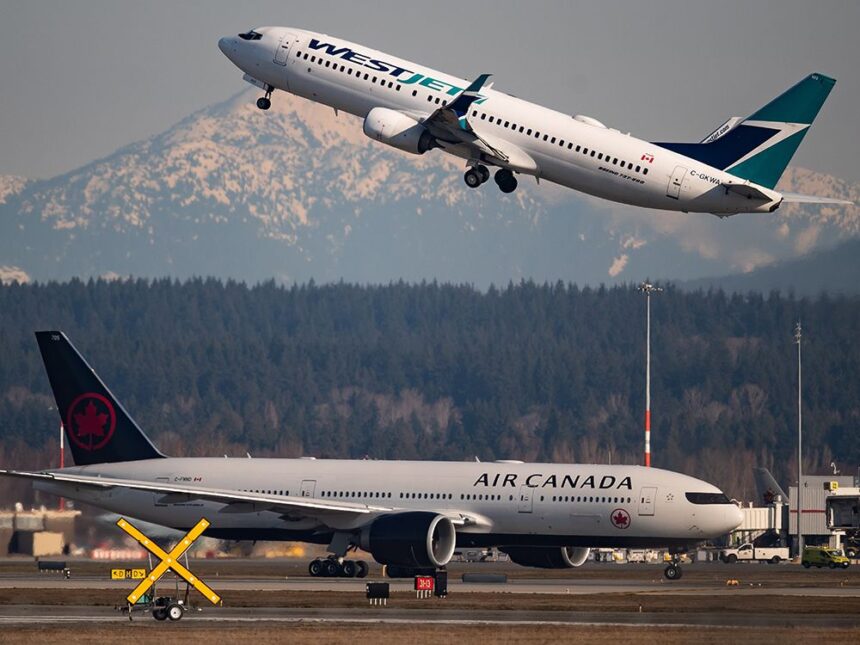The skies above Canada’s aviation market may soon open wider than ever before. In a move that could reshape the country’s airline industry, the Competition Bureau is advocating for the elimination of foreign ownership restrictions on airlines that operate exclusively within Canadian borders.
Currently, foreign investors can only hold up to 49 percent of Canadian airlines, with a single foreign investor capped at 25 percent. This decades-old policy has long been defended as necessary for national security and to protect Canadian jobs. But the Competition Bureau’s new stance suggests these restrictions may actually be hurting Canadian travelers where it matters most – their wallets.
“Increased competition in domestic air travel would likely result in lower prices, more choice, and better service,” states the Bureau’s report released last week. The logic is straightforward: more players in the market typically means more competition for your travel dollars.
The proposal arrives at a critical moment for Canadian air travelers. Recent years have seen rising complaints about limited route options and ticket prices that often leave Canadians feeling like they’re paying premium rates for basic service. A 2023 analysis from Cirium, an aviation data firm, found that Canadians pay approximately 30% more for comparable domestic routes than American travelers.
What makes this recommendation particularly notable is its narrow focus on airlines that only fly domestic routes. International carriers and those connecting Canada to foreign destinations would still face existing ownership restrictions. This targeted approach appears designed to address competitive concerns while sidestepping some of the more contentious national security debates.
Air Canada and WestJet, which together control roughly 80% of domestic seat capacity according to Transport Canada data, have historically opposed significant changes to foreign ownership rules. When reached for comment, both carriers emphasized the importance of “regulatory stability” and “level playing fields” – corporate-speak that typically signals resistance to market disruption.
However, smaller carriers see opportunity. “This could be a game-changer for expanding service to underserved markets,” says Merren McArthur, CEO of Lynx Air, one of Canada’s newer ultra-low-cost carriers. “The current structure makes it extremely difficult to secure the capital needed to grow at scale and truly challenge the dominant players.”
The potential impact extends beyond just ticket prices. Aviation analyst Robert Kokonis of AirTrav Inc. points out that “Foreign investment could bring more than just money – it brings operational expertise, fleet management strategies, and technological innovations that have worked in other markets.”
The timing aligns with other significant developments in Canadian transportation. The government is simultaneously examining rail competition and reviewing the Canada Transportation Act, creating what some industry observers call a “perfect storm” for transportation reform.
Transport Minister Pablo Rodriguez hasn’t committed to the proposal but acknowledged the report’s contribution to “ongoing efforts to improve affordability and service in Canadian air travel.” Reading between the lines of cautious government statements suggests this recommendation will face significant scrutiny before becoming policy.
What would implementation actually look like? The Bureau suggests a phased approach, potentially starting with smaller regional carriers before expanding to larger operators. Such a gradual shift would allow for monitoring competitive impacts while managing potential disruption.
Looking south of the border provides both cautionary tales and success stories. When the U.S. opened domestic routes to foreign-owned carriers (albeit with restrictions), markets like Dallas and Chicago saw fare decreases of 15-20% on competitive routes according to U.S. Department of Transportation data. However, critics point out this also led to market consolidation in some regions.
The path from recommendation to regulation is rarely straight in the complex world of transportation policy. Any change would require amendments to the Canada Transportation Act – a process that typically involves extensive consultation with industry stakeholders, labor groups, and consumer advocates.
For everyday Canadian travelers, the potential benefits are enticing: more flight options, potentially lower fares, and improved service standards as carriers compete more aggressively for customer loyalty. The risk, some argue, is that foreign ownership could eventually lead to reduced service to smaller communities if profit-driven international investors focus exclusively on high-traffic routes.
Consumer advocacy groups have cautiously welcomed the proposal while emphasizing the need for strong passenger protection regulations regardless of who owns the airlines. “Ownership matters less than accountability,” notes John Lawford of the Public Interest Advocacy Centre. “Canadians deserve affordable air travel options with strong consumer protections regardless of whether the airline is Canadian-owned or not.”
The Competition Bureau’s recommendation ultimately represents a significant shift in thinking about how to improve Canadian air travel. Whether it takes flight or remains grounded in bureaucracy remains to be seen, but it has certainly launched a new conversation about the future of Canadian skies.
For travelers perpetually frustrated by limited options and high prices when flying within Canada, that conversation can’t come soon enough.






